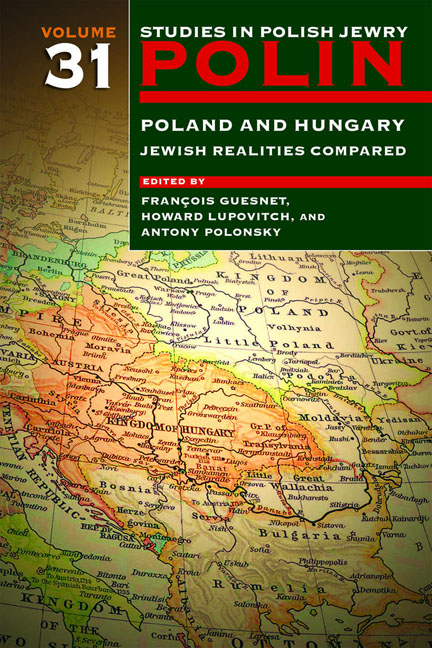Book contents
- Frontmatter
- Dedication
- Editors and Advisers
- Preface
- Polin
- Polin: Studies in Polish Jewry
- Contents
- Note on Place Names
- Note on Transliteration
- Part I POLAND AND HUNGARY: JEWISH REALITIES COMPARED
- JEWISH ACCULTURATION AND INTEGRATION
- JEWISH RELIGIOUS LIFE
- JEWS IN POPULAR CULTURE
- THE INTERWAR YEARS
- THE HOLOCAUST AND ITS AFTERMATH
- PERSONAL REFLECTIONS
- Part II NEW VIEWS
- Part III OBITUARIES
- Notes on the Contributors
- Index
Polish and Hungarian Poets on the Holocaust
- Frontmatter
- Dedication
- Editors and Advisers
- Preface
- Polin
- Polin: Studies in Polish Jewry
- Contents
- Note on Place Names
- Note on Transliteration
- Part I POLAND AND HUNGARY: JEWISH REALITIES COMPARED
- JEWISH ACCULTURATION AND INTEGRATION
- JEWISH RELIGIOUS LIFE
- JEWS IN POPULAR CULTURE
- THE INTERWAR YEARS
- THE HOLOCAUST AND ITS AFTERMATH
- PERSONAL REFLECTIONS
- Part II NEW VIEWS
- Part III OBITUARIES
- Notes on the Contributors
- Index
Summary
WHEN discussing Holocaust poetry two names usually spring to mind: Paul Celan and Nelly Sachs. There is, however, a large corpus of poems on the subject from two eastern European countries, both of which had large Jewish communities before the Second World War: Poland and Hungary. In what follows I shall discuss the best poetry on the Holocaust from both countries, excluding that written in Yiddish.
POLAND
The Holocaust was a subject for most Polish poets after the war. Outrage over the mass killings of Polish Jews was voiced by Antoni Słonimski (1895–1976), who spent the war in exile in England and France, the non-Jewish Władysław Broniewski (1897–1962), whose wife Maria died in Auschwitz, and Tadeusz Różewicz (1921–2014), who was a soldier in the Home Army during the German occupation. There are also a few poems written by Tadeusz Borowski (1922–51) in Auschwitz. His ‘objective’, detached short stories were translated into many languages, including English,1 his prose being superior to his verse. Borowski probably suffered from survivor's guilt, and, though he made a career as a journalist in communist Poland, he committed suicide six years after the liberation.
Tadeusz Różewicz visited the Auschwitz camp in 1948 after it had been turned into a museum, and his visit resulted in two short but powerful poems, ‘Warkoczyk’ (‘Pigtail’) and ‘Rzeź chłopców’ (‘The Massacre of the Boys’), which deal with the murder of young girls and boys by the Nazis, focusing on the most contemptible facet of the genocide: it was not only defenceless civilians who were killed but children, innocent of any possible crime against the Third Reich. The only reason for murdering them was racial hatred.
Różewicz himself had a Jewish background (his mother was a convert to Catholicism), but I do not think this influenced his laconic, minimalistic poetry on the war and the Holocaust. Others who had survived the German occupation in hiding such as Mieczysław Jastrun (1903–83) held a different, more tragic view.
- Type
- Chapter
- Information
- Polin: Studies in Polish Jewry Volume 31Poland and Hungary: Jewish Realities Compared, pp. 395 - 408Publisher: Liverpool University PressPrint publication year: 2018



